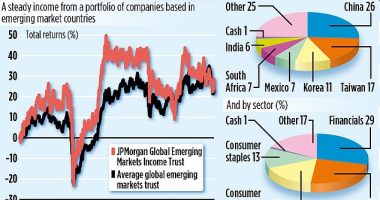
This guide to the best investment accounts and stocks and shares Isas is regularly updated.
Products featured in this article are independently selected by This is Money’s specialist journalists. If you open an account using links which have an asterisk, This is Money will earn an affiliate commission. We do not allow this to affect our editorial independence.
The rise of DIY investing has delivered a revolution in buying shares, investment trusts and funds – offering investors huge savings through online brokers – and the good news is that a new breed of apps has made it even cheaper.
It’s easy to invest in a stocks and shares Isa, self invested personal pension, or standard trading account online and start putting your money to work, without the need for a stockbroker or financial adviser.
That means you can invest around the world from the comfort of your computer or smartphone, but picking the right DIY platform or app is crucial and the array of different options has left many investors scratching their heads.
We explain how to decide on a DIY investment platform to invest in the full range of options: from shares, funds and investment trusts, to ETFs and direct retail corporate bonds.
Check the table for the brief details and read our full round-up of each platform’s features and who they could be good for below.
| Admin charge | Charges notes | Fund dealing | Standard share, trust, ETF dealing | Regular investing | Dividend reinvestment | ||
|---|---|---|---|---|---|---|---|
| AJ Bell* | 0.25% | Max £3.50 per month for shares, trusts, ETFs. | £1.50 | £9.95 | £1.50 | £1.50 per deal | More details |
| Bestinvest* | 0.40% (0.2% for ready made portfolios) | Account fee cut to 0.2% for ready made investments | Free | £4.95 | Free for funds | Free for income funds | More details |
| Charles Stanley Direct | 0.35% | No platform fee on shares if a trade in that month and annual max of £240 | Free | £11.50 | n/a | n/a | More details |
| Fidelity* | 0.35% on funds | £45 fee up to £7,500. Max £45 per year for shares, trusts, ETFs | Free | £10 | Free funds £1.50 shares, trusts ETFs | £1.50 | More details |
| Hargreaves Lansdown* | 0.45% | Capped at £45 for shares, trusts, ETFs | Free | £11.95 | £1.50 | 1% (£1 min, £10 max) | More details |
| Interactive Investor* | £9.99 per month, or £4.99 under £30k holdings, £12.99 for Sipp | £5.99 per month back in free trading credit (does not apply to £4.99 plan) | £5.99 | £5.99 | Free | £0.99 | More details |
| iWeb | £100 one-off | £5 | £5 | n/a | 2%, max £5 | More details | |
| Etoro* | Free but no Isa or Sipp | Investment account offers stocks and ETFs. Beware high risk CFDs in trading account | Not available | Free | n/a | n/a | More details |
| Freetrade* | Free for Basic account, £4.99 per month for Standard with Isa | Freetrade Plus with more investments and Sipp is £9.99/month inc. Isa fee | No funds | Free | n/a | n/a | More details |
| Vanguard | 0.15% | Only Vanguard funds | Free | Free only Vanguard ETFs | Free | n/a | More details |
| (Source: ThisisMoney.co.uk Feb 2023. Admin % charge may be levied monthly or quarterly | |||||||
Why does an Isa or DIY investing platform matter?
Not so long ago, investing typically required a stockbroker or financial adviser and the willingness to hand over a big chunk of commission.
Now armed with a computer – or just a phone – investors can use a DIY investing platform or online broker and the wealth of research at their fingertips to hopefully build their fortune.
The right Isa wrapper or investing account has the power to boost your investments, helping you to build a portfolio and limiting how your hard-won returns are eaten into by fees.
DIY investing platforms act as a place to buy, sell and hold all your investments and a tax-efficient wrapper around them if you choose to invest in an Isa.
When weighing up the right one for you, it’s important to to look at the service that it offers, along with administration charges and dealing fees, plus any other extra costs.
We highlight Isa and non-Isa charges, but don’t forget that investing in an Isa makes sense, as it should protect your hopefully growing investments from as much tax as possible.
We’ve busted the charges of what we consider some of the best (and cheapest) DIY investing platforms, including different fees for buying shares, funds, investment trusts and ETFs. We would advise doing your own research and considering the points below before you choose.


Investing can be as easy as picking up your phone and using it to buy or sell funds or shares – and that’s far cheaper than when it involved calling your stock broker
How we choose the best stocks & shares Isas and DIY investing platforms
We have focused on two vital aspects, cost and quality. This is not a collection of all of the absolute cheapest platforms, these are some we think stand out and that also compete keenly on price.
All discount initial fund charges down to zero in most cases. Some funds can still carry an initial charge though – platforms should provide you with a list to check.
We have picked DIY Isa platforms to suit different investors and focus on those that offer a choice of investments – not just funds. Each one will be better for some investors than others and you should choose depending on your needs. Remember there are plenty of others available too.
This list is in no particular order.
Hargreaves Lansdown is the big gun of DIY investing. The website is packed with information from its advisers and analysts, the shares and fund data is comprehensive and there is a very handy app.
Investors pay a 0.45 per cent fee on their total fund investments up to £250,000; 0.25 per cent to £1m, 0.1 per cent to £2m and nothing above that. Shares and investment trusts also incur a 0.45 per cent charge on the entire holding, capped at £45.
Hargreaves has negotiated some reduced annual management charges from fund managers.
Fund dealing is free. Share, investment trust, corporate bond and ETF dealing costs £11.95 per trade. If you trade more than 10 times per month share-dealing costs step down. Regular monthly share and some investment trust investing is £1.50, dividend reinvesting is 1 per cent, with a £1 minimum charge and £10 maximum.
Hargreaves has its very influential Wealth 50, a range of Master Portfolios, and its Portfolio+ service to make investing progressively easier and more hands off
Hargreaves Lansdown recently announced it would remove exit fees and cut a number of its costs.
Standard non-Isa dealing: Hargreaves’ non-Isa Vantage account carries the same charges except for removing the fee for holding shares and trusts.
Who is it good for? Those looking for an advice-rich service that is price-competitive but not the cheapest around. It does come with lots of bells and whistles, including a very good app and portfolios for easy investing.
Our tests found Hargreaves platform easy and intuitive to use and its newly revised app is good.
It offers a proven popular service weighted towards funds but with access to investment trusts, ETFs, shares and the corporate bond market under one roof. [More details on Hargeaves Lansdown*]
Interactive Investor has monthly fee plans and has just launched a new £4.99 per month Investor Essentials offer for those with portfolios of less than £30,000.
Above that level fees range from £9.99 to £19.99 per month.
There are three plans that can be chosen according to your investment style: Investor, charging £9.99 a month, Pension Builder charging £12.99 a month, and Super Investor charging £19.99 a month.
The Pension Builder option is only available to those just holding a Sipp, otherwise the standard Investor and Super Investor charges plus £10 per month to add a Sipp apply.
With each plan you get £5.99 of trading credit per month, with different charges to buy or sell applying. The trading credit lasts for 30 days. This does not apply for Investor Essentials customers.
In the Investor and Pension Builder plan, trades in UK shares, funds and investment trusts and US shares are charged at £5.99 each.
In the Super Investor plan, trades in UK shares and funds and investment trusts are £3.99 each and £3.99 for US shares.
Trading in other international shares is £19.99 and £9.99 for the Super Investor plan. Dividend reinvestment is just 99p for all plans and regular investment is now free.
Who is it good for? Choose the standard option under Interactive Investor’s charging structure and you will pay £119.88 per year and get back £71.88 in trading credits – but you must spend each one within a month.
The cost of buying and selling UK investments at £5.99 was cut last year from £7.99 and isn’t bad, although fund investing costs more than some rivals. Free regular investing is a winner.
Investor Essentials is a new and interesting idea, cutting the cost of flat fee investing for those starting out or with small portfolios. But investors considering this should remember they don’t that free monthly trade, which rwhen taken into account brings the real cost of the standard £9.99 per month plan down to £4. That said, if they use the regular investing service or don’t buy often, the Investor Essentials plan makes sense.
In This is Money’s view, Interactive Investor’s charging plan makes it a top contender among investing platforms. Service is good and the fees are keen.
Interactive Investor is a good option for those with larger portfolios who would find percentage-based charges elsewhere mounting up. Someone with £100,000 in funds at Interactive Investor would pay £119.88 per year, or just £48 if they used all their trading credit. At Hargreaves Lansdown, with a 0.45 per cent annual fee, they would pay £450.
Our tests show II to be easy to use, with useful functions such as excel portfolio downloads, and an app that has improved greatly in recent times.
[More details on Interactive Investor*]
Fidelity is one of the big investing names and has a platform packed with useful information, guides, market commentary and videos.
Share dealing has a flat £10 fee and this charge also applies to investment trusts and ETFs.
Holding investment funds carries a 0.35 per cent charge up to £250,000 and 0.20 per cent above that and 0 per cent above £1million.
However, if you are investing small amounts the charging structure is slightly different. Fidelity charges a flat £45 on amounts up to £7,500 before the 0.35 per cent rate kicks in.
There are no fund dealing charges for buying and selling.
Who is it good for? Fidelity offers very useful service. It is one of the big guns, has model portfolios, tools to help you decide how to invest and a wealth of information on offer.
Our tests found the main site easy to read and navigate, with lots of helpful information. [More details on Fidelity*]
AJ Bell has a 0.25 per cent annual administration charge.
For non-fund holdings in Isas, such as investment trusts, shares and ETFs, this is capped at £3.50 per month. In a Sipp the cap is £10 per quarter.
For fund holdings it steps down to 0.1 per cent from £250,000 to £500,000 and then nothing above that.
Fund dealing costs £1.50. Share, ETF and investment trust dealing is £9.95 – or £4.95 if you have traded ten times in the previous month.
Regular investing costs £1.50 into funds, FTSE 350 shares and a limited range of investment trusts.
Who is it good for? AJ Bell scores with a low percentage admin charge that is also capped for shares, trusts and ETFs. It does have fund dealing charges, but at just £1.50 these are competitive.
There is cost effective regular monthly investing in funds, shares and selected investment trusts. There is no cheap dividend reinvestment.
Our tests show AJ Bell to be simple to use and while it may not look as flashy as some rivals, it competes well on cost.
iWeb run by Halifax sharedealing offers a competitively priced service. Its stocks and shares Isa offers the chance to invest across shares, investment trusts, funds and ETFs, with a £100 one-off set-up charge but then no admin charge beyond that.
It costs just £5 to buy or sell funds, shares, investment trusts or ETFs. Dividend reinvestment is 2% with a £5 maximum charge.
Standard non-Isa dealing: Charges are the same
Who is it good for? iWeb is keenly priced for those looking to regularly buy investment trusts, shares or ETFs thanks to its low £5 dealing fee but the set-up fee of just £25 has now gone up to £100. Bear in mind that you do need to pay for fund-dealing here. [More details on iWeb]
Bestinvest has had a recent relaunch, with a revived website and update of its offering – including free financial coaching sessions.
Isa and standard investors pay annual charge of 0.40 per cent a year on their portfolios up to £250,000, and 0.2 per cent to £500,000, then 0.1 per cent above that to £1million. No extra charges are added above £1m.
Those investing in its ready made portfolios pay a lower 0.2 per cent and then 0.1 per cent fee.
Bestinvest has no dealing charges for funds, while standard share and investment trust dealing is decent value £4.95.
There are no reduced regular monthly investing charges for shares and trusts, nor is there cheap dividend reinvesting.
One standout element is that Bestinvest offers free financial coaching from its qualified financial planners. Even non-customers can take advantage of this with one free session, while customers get unlimited free financial coaching booked at a time that suits then and done either online or over the phone.
Financial coaching is different to financial advice, with planners unable to recommend specific products, but customers can pay a one-off fee for bite-sized advice. An Investing for your goals session costs £295 and a full portfolio health check is £495.
The site also now features an online risk assessment questionnaire and digital goal planning tools are being introduced, with the first a retirement planner.
Standard non-Isa dealing: Charges are the same.
Who is it good for? BestInvest’s relaunch has given it a fresh look, bringing lots of useful information and help to the forefront. The thing that makes it stand out from the crowd is free financial coaching and the bite-sized advice options.
Those buying shares, investment trusts and ETFs benefit from a £4.95 dealing fee, which is lower than most. The ready-made portfolios offer an easy hands-off route into investing at a reasonable cost. [More details on BestInvest*].
The broker’s online platform Charles Stanley Direct platform has a 0.35 per cent annual charge on fund holdings, above £250,000 of fund holdings charges begin to step down.
There is also a 0.25 per cent charge on investment trust or share holdings, with a minimum of £24 and maximum of £240 per year. This is removed monthly if you trade at least once in that month.
A Sipp costs £100 plus VAT per year but this fee is removed if you have more than £30,000 across all the broker’s online platform services.
Fund dealing is free, but investment trust and share dealing will cost £11.50 and there is no regular investing option for this.
Investors holding individual bonds and overseas shares must pay £30 per year per holding.
Who is it good for? Active fund investors get a good deal at Charles Stanley with a low annual fee and no buying or selling charges. This is also a decent Sipp option for those with more than £30,000, who can then avoid the extra fee for pensions.
Those buying and holding investment trusts and shares can also do well if they trade each month and lose the platform fee, but that needs to be weighed up against £11.50 dealing charges adding up and the lack of a cut-price regular monthly investing option.[More details on Charles Stanley Direct*]
…Or for cheap investing with less choice
US giant Vanguard has set up a UK investing platform but you can only buy its funds.
It is cheap with a 0.15% per year fee and has no costs for buying and selling. You can use this to buy Vanguard’s simple and cheap passive funds, its active range, or its all in one LifeStrategy funds that invest in shares and bonds around the world.
Who is it good for? If you are looking for a simple and low cost investment platform, Vanguard is a good choice. You only get its funds but the firm’s trackers and ETFs are among the best in the business – this is a particularly good option for those looking to start out with LifeStrategy funds.









